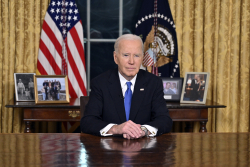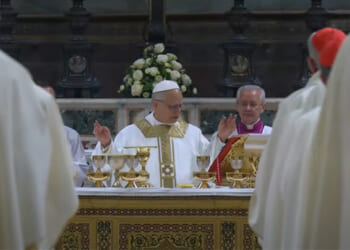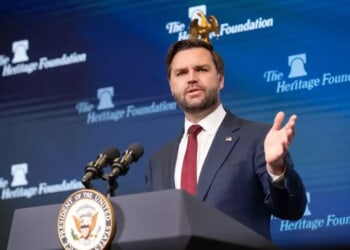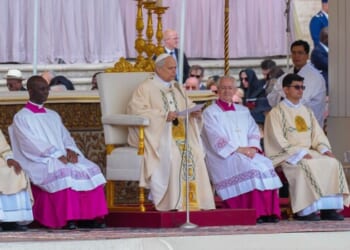Macron’s lame-duck position on the domestic political scene has pushed him exerting a baleful influence in the Middle East.
Two years is a lifetime in politics. However, for French president Emmanuel Macron, 2027 is coming up as fast as a runaway train as he seeks to carve out a place in history before he leaves power for good. Even if his nemesis, the far-right Marine Le Pen, is prevented from running to replace him in 2027 by a recent court decision, Macron has little domestic wiggle room. Consequently, he has taken his struggle for political relevance to the only arena he has left—foreign policy.
Even there, his options are limited. At the beginning of 2025, France continued its withdrawal of forces in what amounted to a stinging rebuke from its former colonies in the African Sahel. That leaves him with only one area of former French colonial influence to grasp for relevance—the Middle East.
As I wrote previously for the Middle East Forum:
The French approach to the Middle East changed after the Israeli victory in the 1967 Six-Day War. President Charles De Gaulle began to espouse the decidedly pro-Arab policy that continues to the present. De Gaulle explained, ‘The Arabs have for themselves their numbers, space, and time.’ It was a Machiavellian calculation. He pursued what he saw as a long-term strategy: sacrificing good ties with Israel in order to win the goodwill of the more populous and oil-rich Arab world.
Macron, like all other French presidents since de Gaulle, has followed this policy, implemented by the Arabist Quai d’Orsay (the location of France’s foreign ministry and its common metonym).
Starting with Lebanon, with whom France has had a special relationship since 1649, Macron has followed the classic French policy. For example, France’s position on Hezbollah has been very problematic; one might even say schizophrenic. Despite Hezbollah’s history of terror attacks against France, former French president Jacques Chirac invited Hassan Nasrallah, the group’s late Secretary General, to attend the Francophone Summit in Beirut in 2002.
When they met, Chirac commented that “Hezbollah is an important component of Lebanese society.” Unsurprisingly, in May 2004, the then-French ambassador to the United States, Jean-David Levitte, told this author that Hezbollah is mostly a “social” organization and that there was no reason to put the group on the European Union’s terrorism blacklist. Accordingly, France held off doing so until 2013, only then backing the limited British initiative to put the “military wing” of Hezbollah on the list.
Today, Macron continues to talk to Hezbollah as he would any legitimate political actor and wants to remain an “honest broker.” That’s why he lobbied the Biden administration to ensure that France would work with the U.S. to ensure that the ceasefire in Lebanon announced by the U.S. in November 2024 would be fully implemented and enforced. In doing so, Macron had used a bait-and-switch tactic—first, France seemed to indicate it might arrest Israeli prime minister Benjamin Netanyahu and former defense minister Yoav Gallant if they set foot on French soil based on the contested International Criminal Court charges, then withdrawing the threat, which was simply a form of pressure to convince Israel’s prime minister to allow France to mediate ceasefire negotiations with Lebanon.
Unsurprisingly, on the question of Israel, Macron is by and large following the Quai d’Orsay’s post-1967 policy. Macron seems to want to continue walking in the footsteps of his predecessors, De Gaulle and Chirac, in the eyes of Arab opinion, as the only Western leader who can counter U.S. support for Israel.
There is a domestic factor that contributes to the French government’s increasingly skewed Middle East policy. The increasing Muslim population of France, representing already 10 percent of France’s 68 million residents, is playing a part in Macron’s calculation. This is even more so than in the past two decades. The Islamist element among French Muslims has grown rapidly, overpowering more moderate Muslim voices.
Macron is walking on hot coals because he is afraid that the suburbs will rise up and explode as they did back in 2005 if he supports Israel in any way, shape, or form. Unsurprisingly, Macron just announced that France could recognize a Palestinian state by June, an initiative that the terror group Hamas quickly endorsed.
Macron’s lame-duck position on the domestic political scene has pushed him into trying to exert influence in the Middle East. He also wants to avoid a major societal explosion at home. He wouldn’t want his already poor track record tainted by yet another disaster. It is a sad denouement for the once-glorious France.
About the Author: Olivier Guitta
Olivier Guitta is the Managing Director of GlobalStrat, a security and geopolitical risk consulting company for companies and governments. Follow him on X: @OlivierGuitta.
Image: Sasa Dzambic Photography / Shutterstock.com.
















